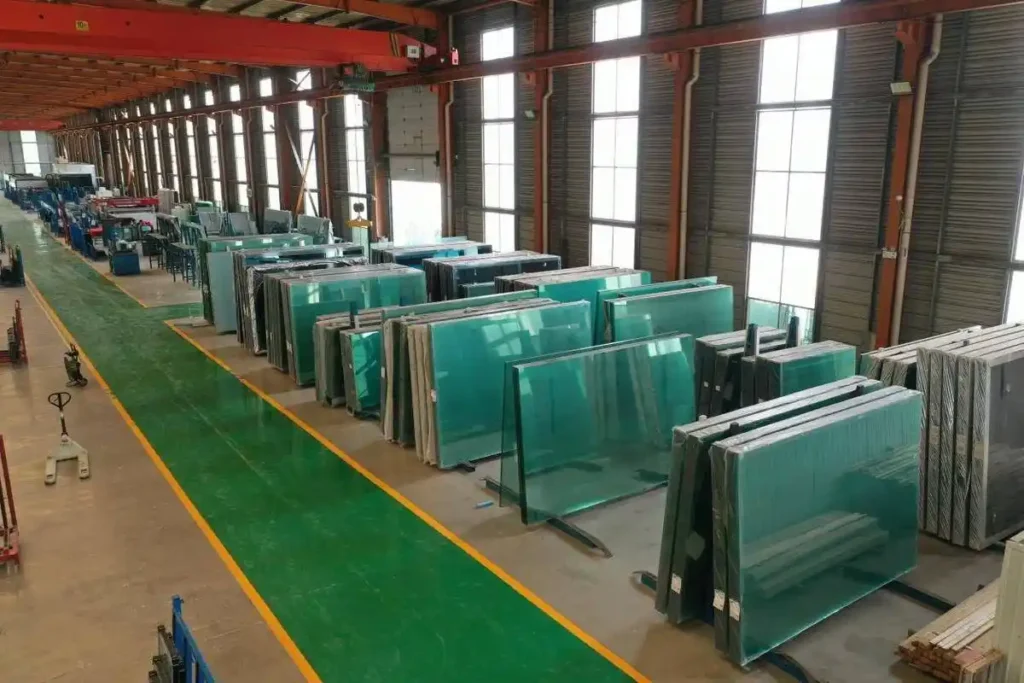
Glass production is an energy-intensive industrial process involving multiple high-temperature process links such as raw material melting, molding, annealing, cleaning, and drying, which usually consumes a lot of energy. High-temperature heat pump technology has gradually been applied in the glass industry with its high efficiency and environmental protection characteristics, providing Solutions for enterprises to save energy, reduce emissions, and improve efficiency.
Analysis of heat demand in glass production
In the glass production process, heat energy demand is mainly concentrated in the following links:
- Raw material melting
- Process requirements: Heat raw materials such as silica sand and soda ash to above 1500°C to form glass liquid, and the heat source is a high-temperature electric furnace or gas furnace.
- Features: The heat demand is large, but it is difficult to be directly met by a heat pump.
- Glass molding
- Process requirements: Pull, blow or press the glass liquid at a temperature of 800~1200°C.
- Features: High temperature environment is required, mainly using gas or electric heating
- Annealing treatment
- Process requirements: Control the glass to slowly cool down at 600~700°C to eliminate internal stress.
- Features: Strict temperature control requirements and stable heat source are required.
- Glass cleaning and drying
- Process requirements: Use low-temperature hot water to clean stains on the glass surface and dry it with hot air.
- Temperature range: 4080°C (cleaning); 80120°C (drying).
- Features: Heat pumps can efficiently provide hot water and hot air.
- Process requirements: Recover heat from high-temperature exhaust gas or cooling water for preheating raw materials, heating or cleaning processes.
- Features: Waste heat recovery is the main application area of heat pumps.
Specific applications of high-temperature heat pumps in glass production
- Annealing furnace thermal energy support
- Application scenario: Provide constant temperature air of 600~700°C for annealing process.
- Heat pump function: By increasing the waste heat of exhaust gas or cooling water, it is used to maintain the constant temperature required by the annealing furnace.
- Advantages:
- Reduce the energy consumption of direct heating from high-temperature furnaces;
- Improve energy utilization.
- Glass cleaning and drying
- Application scenarios: After production, the glass needs to be cleaned with 40-80°C hot water and then dried with 80-120°C hot air.
- Heat pump function:
- Supply low-temperature hot water for cleaning;
- Provide stable hot air for drying, reducing the energy consumption of traditional electric heaters.
- Advantages:
- Precise temperature control to avoid changes in glass stress caused by high temperature;
- Reduce operating costs and improve thermal energy utilization.
- Waste heat recovery and reuse
- Application scenarios: A large amount of high-temperature exhaust gas and cooling water are generated during glass melting and forming.
- Heat pump function:
- Recover the heat of exhaust gas and raise it to a higher temperature for cleaning or preheating raw materials;
- Extract heat energy from cooling water for workshop heating or hot water supply.
- Advantages:
- Significantly reduce energy consumption;
- Reduce direct waste heat emissions and improve workshop environment.
- Workshop temperature control
- Application scenario: The workshop of the glass factory needs to maintain a constant temperature to avoid the impact of excessive temperature difference of the equipment on product quality.
- Function of heat pump:
- Provide heating in winter and cooling in summer;
- One machine has multiple uses to meet the temperature control needs throughout the year.
- Advantages:
- Improve the comfort of the production environment;
- Reduce the use of traditional air-conditioning systems.
Actual case: Energy-saving transformation of high-temperature heat pump in a glass factory
Project background
A glass factory has an annual production capacity of 200,000 tons and uses gas boilers and electric heating equipment for heating. The energy consumption is high and the exhaust gas emissions are serious. The company hopes to reduce operating costs and carbon emissions through energy-saving transformation.
Transformation plan
- Install a high-temperature heat pump system to provide 40~120°C hot water and hot air for glass washing and drying;
- Equipped with a waste heat recovery module for preheating cooling water and workshop heating;
- Replace some auxiliary heating equipment in the annealing process to optimize energy use.
Transformation effect
- Energy saving: overall energy consumption is reduced by 35%, and the annual cost saving is about 3 million yuan;
- Environmental benefits: reduce carbon dioxide emissions by about 7,000 tons;
- Product quality: annealing and drying temperature control is more precise, and the stability of glass quality is improved by 10%;
- Return on investment: the transformation investment will be paid back within 2 years.
Advantages of high-temperature heat pumps in glass production
- Energy saving and environmental protection
- The heat pump system has a high energy efficiency ratio and reduces dependence on fossil fuels;
- Reduce the energy waste of direct high-temperature exhaust gas emissions.
- Accurate temperature control
- The heating temperature can be accurately adjusted according to process requirements to ensure the quality of glass processing.
- Waste heat utilization
- Recover low-grade heat energy in exhaust gas and cooling water to improve heat energy utilization efficiency.
- Economical and efficient
- Replace traditional heating equipment, reduce operating costs, and meet long-term energy-saving needs.
- Sustainable development
- Help the glass industry achieve energy conservation and emission reduction goals, in line with the trend of green manufacturing.
Conclusion
The application of high-temperature heat pumps in glass production is bringing technological innovation and economic benefits to the industry. Through efficient thermal energy management and precise temperature control, high-temperature heat pumps can not only optimize production processes, but also significantly reduce carbon emissions, providing strong support for enterprises to achieve sustainable development. If you want to know more about the specific application cases or technical solutions of high-temperature heat pumps in glass production, please Contact Us!


